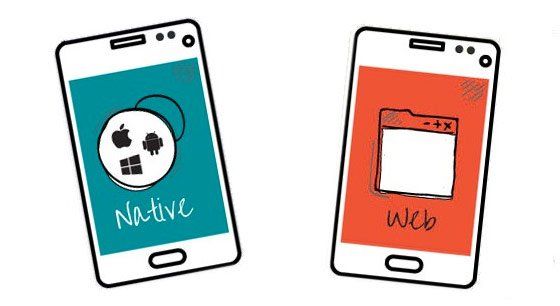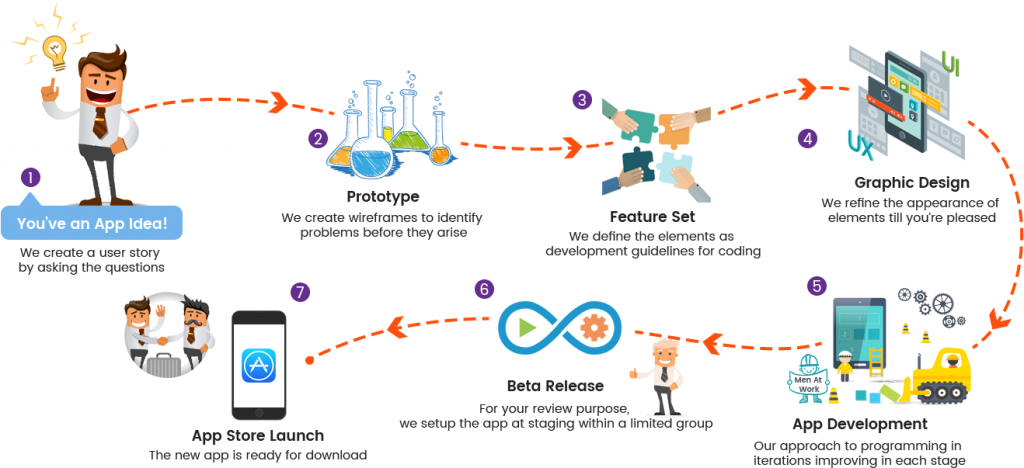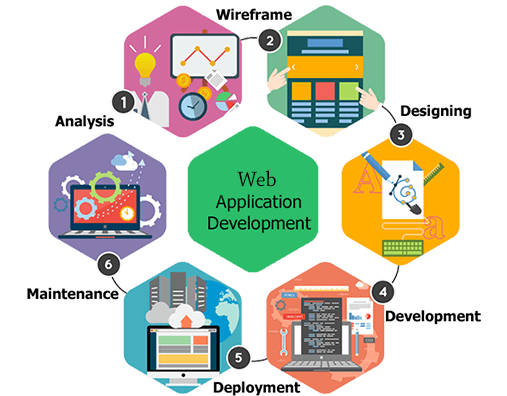Native Apps Vs Web Apps: Which Is Best For Your Business?

Mobile App Development is a complex process that requires a lot of research and planning. The stages of making a successful app begin with an idea. Then the idea goes through a thorough analysis followed by designing, developing, testing, and launching. It is then marketed to reach your target audience.
In the analysis phase, there is one question where most people get caught up, whether to go with a platform-specific app or not.
A platform-specific app is nothing but an app developed for individual platforms like iOS or Android exclusively. These are more popularly referred to as Native apps. Web apps, on the other hand, are applications that are accessed via a web browser.

Native App Development
Native mobile applications are the most common type of applications. These are built for specific platforms and are written in languages. For example, Swift and Objective-C for native iOS apps and Java or Kotlin for native Android apps. Native apps are also built using the specific Integrated Development Environment(IDE) for the selected operating system.
Both Apple and Google app developers with their own development tools, interface elements, and SDK. Most companies will invest in native mobile app development because of the multitude of benefits offered in comparison to web apps.

Advantages of Native Apps
- Native apps deliver the best performance of all other development approaches.
- It receives complete support from app stores and the overall app marketplace.
- Native development allows developers to access the full feature set of the selected operating system.
- The user experience of a native app is far superior to web apps. To the user, the flow is more natural because of each mobile operating system’s specific UI guidelines and standards.
- A native app must be approved by its respective operating system.
Disadvantages of Native Apps
- Native apps use difficult programming languages that require experienced developers.
- Expenses are more costly upfront for native apps compared to web apps.
- Native apps are not the best option for simple applications.
The initial cost of native app development may be higher than other options but this development approach will save money over time. Native Apps offer a great user experience, better performance, and accessibility because of that native apps are able to offer users a more personalized product.
Web App Development
Web apps are different from websites. A website typically offers more information than a web app can display, therefore web apps condense website content to improve functionality. A web app loads in Web browsers like Chrome, Safari, or Firefox, and doesn’t need to be downloaded from app stores like native mobile apps. Web apps also don’t take up storage on the user’s device.
If your goal is to offer mobile-friendly content to a wide range of users, a web app might be the appropriate development path. Web apps are a cost-effective way to put your product in the hands of a lot of users. keep in mind, users have incredibly high user experience and functionality standards that web apps sometimes can’t deliver. Users are easily frustrated with performance and usability issues like load times, small images and network availability.

Advantages Of Web Apps
- Web apps are relatively easy to maintain because they use a common code base across multiple mobile platforms.
- Web apps can be built for all platforms as long as they can run in an appropriate web browser.
- Compared to native apps, web apps are less expensive upfront.
- Web apps don’t adhere to standard operating system protocols and don’t require approval from the app marketplace; they can be released at any time and in any format.
- Updates to web apps don’t need to go through an app store meaning the user doesn’t have to manage updates manually. The newest version always loads when a user opens a web app.
Disadvantages Of Web Apps
- Web apps have a much smaller scope when it comes to leveraging device features and hardware.
- They are slower and much less responsive than native apps.
- Web apps are less interactive and intuitive compared to native apps.
- There are fewer branding opportunities with web apps. An app store listing presents an invaluable opportunity to convey an app’s unique value proposition.
Where your focus should be while choosing an app type?
The path you will take when it comes to native and web apps will depend on many factors, and two businesses will rarely answer these questions the same.
Before we get to the factors that will affect your decision, let’s first cover some of the key differentiations between native and web applications.
- Programming languages are built-in
This can vary from native device languages such as Switch and Java to web-based technologies with HTML, CSS, and JavaScript. - Access to native device APIs
This implies the ability of the app to use the device’s native features and other available APIs. - Distribution method
This defines the channel through which the app will be findable- app stores or the web. - Multi-platform support
This simply means that different types have different abilities to run on iOS and Android.
Before we get deep into it make sure you know the answers to all the following questions :
- How fast do you need the app to be developed?
- What budget are you working with?
- What are you trying to accomplish with the app?
- What features do you need in order to do that?
- What experience do you want to convey with your app?
- What are your options for in-house and outsourced development?
Native App vs Web App: Best Fit For Your Bussiness
If you have answered the questions about what matters to you when developing your app, you should now have a clearer picture of which app type might suit your app needs. They vary in cost, Time, and resourcing, as well as their abilities to fulfill different business needs.

Time To Market
The time takes to develop an app is the shortest for web apps and the longest for native apps. Native apps take extra time because of two separate development processes for iOS and Android.
Another factor that may affect the time to market for native apps is the app store approval process, so it’s crucial to account for this early in development and optimize to ensure a smooth and quick launch.
Target Audience And User Experience
Who you are targeting makes all the difference. Based on your audience’s preferences, context, and pain points, some app types will fulfill their needs better than others.
For example, if your app needs frequent updates – and your audience counts on it, web apps will work better than native apps.
On the other hand, if you know your audience will need the practicality of downloading an app and accessing it offline, native is the way to go.
Features Of The App
A huge role in this decision-making process is the key features you want your app to have. First of all, there is a clear distinction between web and native from their ability to use the device’s native APIs.
Some apps may be perfectly functional without relying on native phone features, but others may be unusable in that case. Knowing what functionalities you need at this stage will make your decision easy.
Another element you need to focus on is the device’s ability to run the app with all its features and layers, as well as any future capabilities you may want to add to it later on. This way, you can make sure to allow yourself space for growth and not restrict yourself because of an app type.
Available Budget
The cost of development primarily depends on the programming languages and the desired time frame. Native apps are by far the most costly as they require hiring experienced developers and a longer time to develop, and the costs may be double because of two platforms and most often two developers or developers teams.
If other factors indicate that a web app will be good enough to accomplish your app’s aim, it is a good path budget-wise.
Discoverability
Your marketing strategy may largely affect your app type choice because of your app’s ability to be organically discovered. While web apps are not present in in-app stores, they are easily shared as websites using email, social, and any other channels that have proven successful for your business.
On the contrary native apps live in apps live stores and can be optimized for search and app store rankings because of descriptions, reviews, screenshots, and more. Web apps are deprived of that opportunity and their distribution heavily relies on classic digital marketing.
If your app needs to execute more heavy-duty tasks and its speed and performance are the key to its success, native apps are your ideal choice and worth the time and the budget you will invest. This definitely includes games or any apps that rely on the use of photos or videos.
Or if you want your app to work in real-time and be straightforward, easily updated, and isn’t performance-stressed, web apps are the way to go. They don’t require access to the native layer and are quick and relatively cheap to develop, allowing you to reach your mobile marketing goals sooner while fulfilling your user’s needs.
Bottom Line
These two app types each carry their own benefits and downfalls, and the choice you make will impact the course of your growth. this is why the key to this process is understanding your assets and limitations and using them to get the best return in the form of your app.
And after you have considered your options and made your choice, It is crucial you work with developers that can visualize your idea and bring it to life on your budget and according to the core goal of your business. It is important to work with a team that is knowledgeable and experienced in the exact technology that supports your choice so your app can achieve its full potential.
